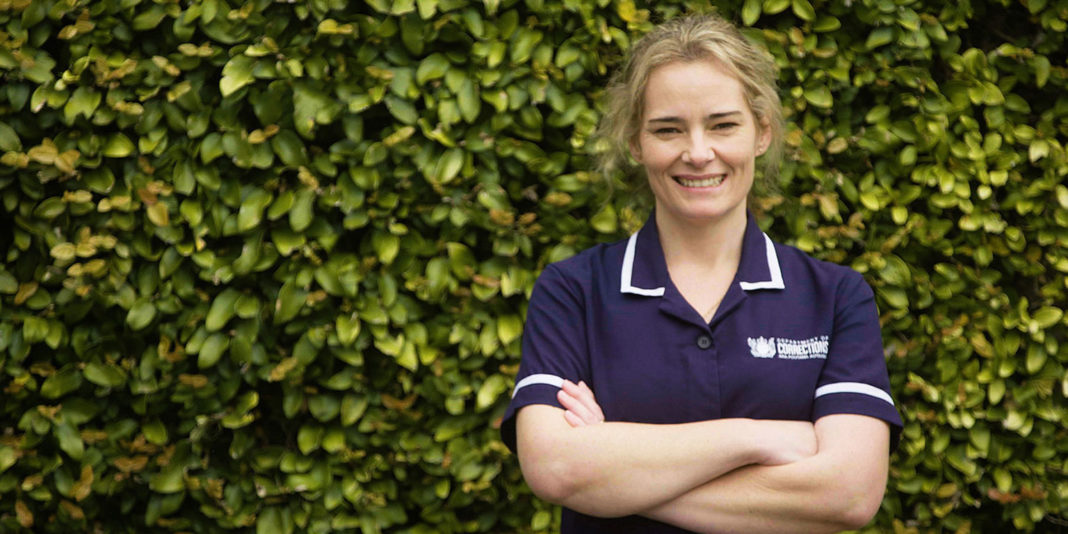Sponsored Article
After 15 years as an emergency department nurse Sarah Nabizada was seeking a change.
“I needed to find hours that worked for my kids, so when a friend saw an ad for a Corrections Nurse, and suggested I apply, I did, and here I am.”
Born in New Plymouth and trained in South Auckland, Sarah’s diverse nursing background includes mental health and surgical nursing. Most recently she has been an ED nurse at Auckland’s Middlemore Hospital but she has also worked at Taranaki Base Hospital, and spent some time in a hospital in Saudi Arabia.
Three years on Sarah is now clinical team leader at the prison. She is passionate about the opportunities that Corrections nursing provides. She says if you are a highly skilled registered nurse who is both passionate and professional about working with patients holistically this could be the nursing career for you. Prison nursing is a job where no two days are ever the same.
“It’s exciting, it’s busy, and it’s hugely varied – you never know what the day might bring. One day might involve responding to multiple callouts that can range from an acute emergency to helping a new diabetic understand their condition.”
Corrections health services are nurse-led, but we work closely with doctors, dentists and other visiting health professionals in the prison health centre, explains Sarah.
“Our nurses need really good assessment and communication skills; they need to know when a patient needs to be referred to another service for care or treatment. Nursing in a prison is unique and quite different to practising in other parts of the health system.
“Many people coming in to prison haven’t seen a health care professional for years and nurse consultations cover a wide range of physical and mental health issues. We routinely screen for diseases as well as long term conditions. Drugs and alcohol are a significant health issue for the people we work with. We have people coming into prison who maybe withdrawing from a cocktail of substances and we actively support the withdrawal process following national guidelines.
“We are the prisoner’s health connection; nurses are the health practitioner most people in prison see most often. We enjoy the continuity of working with someone to hear their health history, order tests, make referrals and then do the follow-up. Once we get test results back, we help people understand the meaning for their health. The role involves health promotion and health education as well. For example a big part of our work is helping prisoners better understand their illness and the medicines that they are prescribed. So many people come to prison after neglecting their health for a long time.
“Sometimes we are the first people a prisoner will disclose things that have happened to them during their lifetime – we are then able to refer them to the right people and agencies to get help.
“Many people come in to prison in such a vulnerable state, and we do our best to help them get their health needs back on track. We can often follow up to re-schedule missed appointments and outstanding referrals, make sure they are prescribed the medication they need, and that they can access treatment from our services or sometimes from other services. We work with the aim of improving people’s health and wellbeing so that when they go back to the community they are in a better place.”
But isn’t it scary working in a prison? Do the nurses feel safe?
“Here at Corrections, safety comes first. The risks are constantly being assessed, and whenever you are with a patient, the Corrections Officer is right there.
“Everything is in place to keep us very safe. The same as in any health setting, patients sometimes want medicine or treatment that is not appropriate for them. Of course some of the prisoners don’t like being told ‘no’… but I have never been pushed or shoved, or felt physically threatened. Verbal abuse is not tolerated, the prisoner will be charged, and you will be offered excellent debriefing and support. If you don’t feel safe we only need to say “I don’t want to do this’ and we will be supported 100 per cent. We are offered very good support from Corrections and from fellow prison and nursing staff.
“I don’t think other nurses know how many nurses work in prisons. We have a 40-person team here at Mount Eden Corrections Facility made up of registered, and enrolled nurses and health care assistants, as well as managers and administration staff. Nationwide, Corrections employs 285 nurses, and nursing in prison offers a career pathway and opportunities for advancement,” says Sarah.
“Corrections provides support for education and mandatory training. You can be supported to undertake post-graduate study, become a registered nurse prescriber, a nurse practitioner or a health centre manager.”
Nurses in prisons need the skills inherent in all nursing and then some, says Sarah,
“As well as empathy, a willingness to learn and wanting to make a difference, you also need to be able to hold your patients accountable for their interactions with others and with us and to manage professional boundaries. A sense of humour also definitely helps.
“Some people ask how can I work with people who have hurt others? I say, yes there are some people here who have committed some horrific crimes, but the majority of the prisoners in here are products of their environments and many are victims of violence and abuse themselves. I see the potential of nurses in prisons to reduce crime and re-offending and create safer communities. I think I am playing my part in supporting a prisoner to change their lives – by educating them during a health check and helping them stay healthy. It’s what I am passionate about.”
Having knowledge of Te Tiriti O Waitangi, te reo Māori and tikanga Māori is a huge bonus in Corrections nursing, says Sarah.
Sarah points out that prison nurses’ hours are 6am to 10pm, with good penal rates in the weekend. She says if anyone is even just a little bit interested then apply for a job, and they will be shown around the prison and have the job thoroughly explained.
“The biggest thing for most nurses at Corrections, including myself, was getting to the prison gates. As soon as they walk in, 99 per cent of the nurses I’ve met ask, ‘When can I start?’”
For further information about nursing for the Department of Corrections you can click here.





















